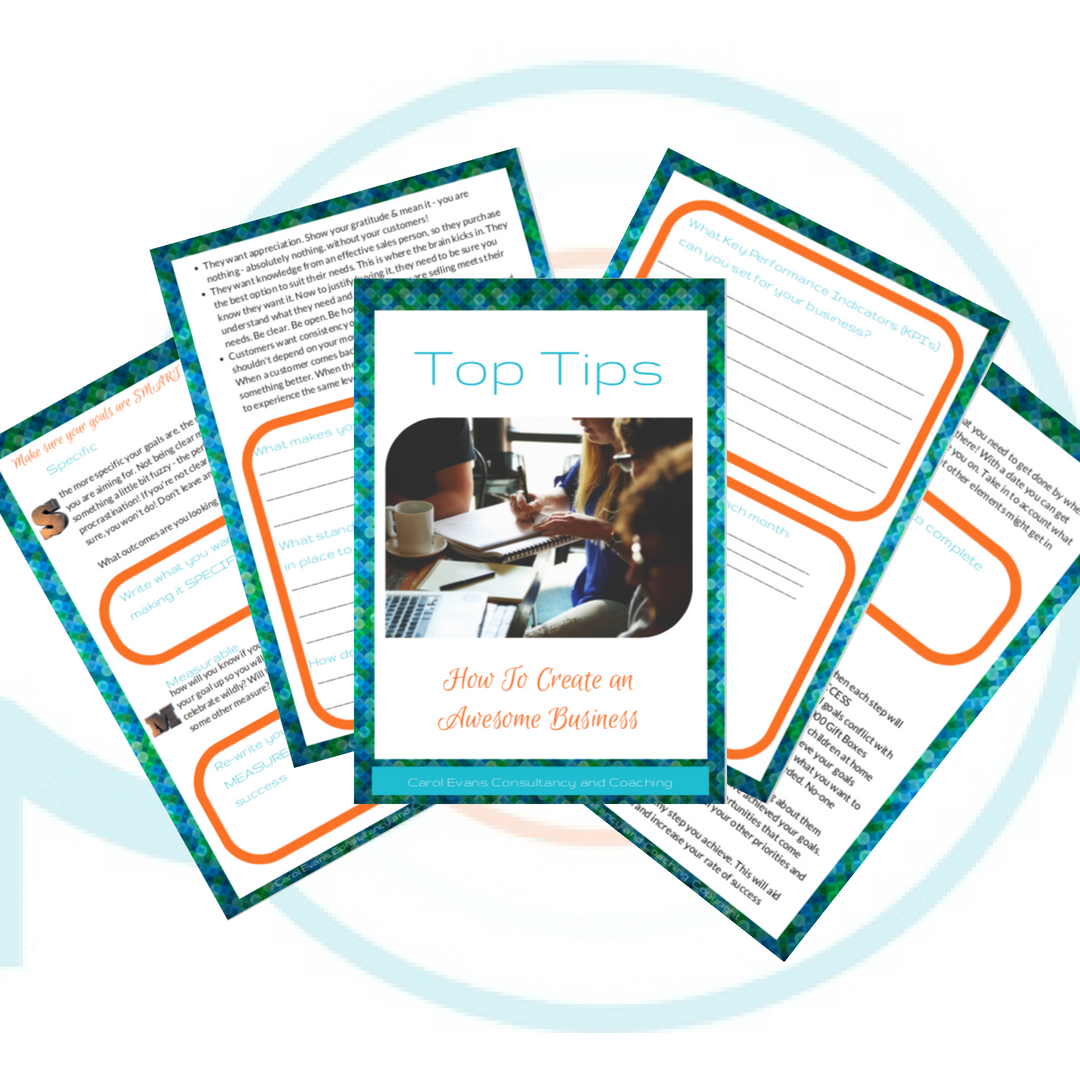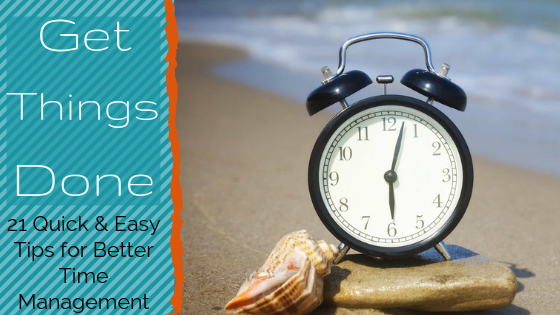Get Things Done. 21 Tips for Better Time Management
Do you ever get to the end of the day and wonder how you managed to get so little done? You’re not alone. And while you shouldn’t be too hard on yourself for your time management shortcomings, here are 21 ways you can get more done.
Make appointments with yourself
This was actually a game changer for me!
If a task or project is important enough to do, it’s important enough to add to your calendar. Get in the habit of calendaring everything, and sticking to those appointments.
You should place as much importance on your appointments with you do with client appointments. You would never miss a client appointment because the cost of doing so would be so high, so why treat yourself as any less important? Your time is just as valuable, so don’t let yourself get away with broken appointments!
If you don’t get those tasks done, you don’t achieve your goals.
Set a timer
No matter what task you’re working on, set a timer—preferably one that makes an audible ticking sound. You might choose a 25-minute time block as recommended by proponents of the Pomodoro Technique, or you can simply set a timer to remind yourself of your next appointment. The psychology is the same no matter which method you choose.
The idea here is that the ticking sound helps keep you on task. It’s a subtle reminder that you’re supposed to be working, so when you’re tempted to wander off to check Facebook, your subconscious will help keep you focused.
Take a day off
Have you ever noticed how much more you get done in the last days before heading off on holiday? I know I’m caught up in this cycle at the moment! Suddenly you’re super motivated to:
- Return all those phone calls you’ve been putting off
- Clean out your email inbox
- Finish your bookkeeping for the month
- Get the rest of the month’s blog posts written
And anything else that represents an “open loop” in your life or business.
You can create that same sense of urgency to get things done simply by scheduling a day off. In fact, you may even decide to take this strategy one step further, and take an extra day off each week!
Give yourself permission to say no
You’re not responsible for everything, but all too often we feel that we simply cannot say no…to anything.
This is especially true for entrepreneurs, because you just want to help everybody. But if you try to accommodate everyone, you’ll wind up stressed out, overworked, and your time management skills will suffer.
Instead, learn to say no. Say no to the client you don’t want to work with. Say no to the volunteer position you don’t have time for. Say no to another year as treasurer for your local club. You can (and should) even say no to household chores that don’t have to be done.
After all, no one will be harmed if your living room doesn’t get dusted today. Wouldn’t you rather spend your time working on something that really matters?
Take a break
Too much time spent at work can be decidedly UN-productive. When it begins to feel like you’ll never get all your work done, it’s the perfect time to step away from your desk for a quick break.
Go for a walk in the park. Nature has a wonderful way of recharging our batteries.
Play with your kids. They’ll remind you why you do what you do every day.
Read a novel. Paint a picture. Knit a scarf. Just do something other than work. It will improve your perspective and give you more energy to face the rest of your day.
Some of my recent activities have included painting a couple of staircase spindles at a time, or when it’s been sunny, getting in the garden and painting a fence panel. As well as giving you that much needed break from your work, it helps a big job get done bit by bit.
Give up control
A leading cause of overwork—especially for “type A” personalities—is the feeling that you must have control over everything. When you mistakenly believe that no one can do your job as well as you can, you’ll take on too much work and ultimately fail to get everything done.
A far better choice is to give up some control and allow others to help.
Does it really matter that the towels aren’t folded precisely as you’d like? Or that a sales page isn’t formatted quite the way you’d have done it?
Probably not. Learn to recognise when good enough really is good enough, and let go of your need to have everything “just so.” You’ll save hours of time that can better be used on other projects.
Practice focusing
How many browser tabs do you normally have open while you’re working? (I’m very guilty of this!!) Ever listen to a webinar while responding to emails? How about browsing Facebook while writing a blog post?
All these multi-tasking habits (and many others) are massive time-wasters that can turn a 30-minute task into an afternoon of accomplishing next to nothing. While we all like to think we’re good at multi-tasking, the truth is, multi-tasking is really “task switching,” and every time you stop to quickly do something else, you lose your focus. That lost momentum costs you added minutes every time you turn your attention back to the task at hand.
So close all those browser tabs, turn off your webinar, put a block on Facebook, and regain your focus. You’ll be amazed at how much more productive you’ll be.
Schedule shorter meetings
No other workday task manages to feel so important while being such a waste of time. Nip these time-sucks in the bud by scheduling only those meetings that must happen, and keeping them to a minimum.
- Skip the small talk
- Create an agenda—and stick to it
- Make sure everyone knows the meeting’s purpose and expected outcome.
- Use email to discuss non-urgent topics
I also like to estimate a return on investment from meetings. Realise how much each meeting costs and ensure you get a proper return on investment from it.
The obvious exception to this rule is your client meetings, but even those can be more productive and maybe even shorter by applying the rules above.
Reduce interruptions
Text messages, Skype conversations, email notifications and other “urgent” interruptions will take you out of the moment and add up to hours of lost time over a week.
Make it a habit to turn of your phone, Skype, email and other instant message applications while you’re working. Between tasks, schedule a quick check in if necessary, but don’t allow these interruptions to dictate the course of your day.
Work remotely
Always working at your desk can put you firmly in a work rut. Want to get more done? Change it up a bit. You became an entrepreneur to have more freedom, so enjoy it—and get more done in the process.
- Take your laptop to the library or coffee shop for an afternoon of phone free work.
- Head to the park on a nice day and let the beauty of nature inspire your product or content creation.
- Rent an office for one day each week to get away from distractions such as laundry, television and other work-at-home pitfalls.
If it’s sunny, even sitting out in the garden to do planning tasks, research etc can be all the change you need in a day.
Plan your day the night before
Do you turn on your computer in the morning and immediately jump into Facebook or email because you don’t know what you’re supposed to do next? Or do you turn to your calendar first to know what task you should be focused on?
Schedule 15 to 30 minutes at the end of each day to plan out the next, and you’ll never again be caught wasting the first hour of the morning on non-essential tasks.
Pick 3 things
If your to-do list looks more like a grocery list after you haven’t shopped for a month, your productivity is going to suffer. Trying to focus on all those “must do’s” will have you instantly overwhelmed and jumping from task to task as you struggle to get it all done.
A far better option is to pare your list down to three things you absolutely must get done. Prioritise those, set your timer, and get to work.
Without the distraction of an endless to-do list, you’ll be better able to concentrate on what really needs to happen, and you’ll be much more likely to get your projects done quickly.
And when those three tasks are done you can choose to add three more to your list, or take the afternoon off. You deserve a break!
Schedule time for email
When is the last time you received a truly urgent email? If you’re like most people, the answer is rarely, if ever. So why do we keep our email client open all the time and obsessively check it each time that bell dings or the little red number pops up to tell us we’ve received an email?
Allowing your email to dictate how you spend your time is a recipe for distraction, and it can turn your best-laid time management plans into little more than a wistful fantasy.
Just like you schedule time for your projects and client meetings, schedule time for email. Allow yourself 30 minutes in the morning and 30 minutes in the afternoon (or more if necessary, depending on the volume of email you receive) to process your inbox. Strive to “touch” each message one time. Either:
- Respond to it
- Do it (if it’s a task)
- Delegate it
- File it
Strive to reach “inbox zero” each time you process your emails, and your time will never again be dictated by the demands of your email client.
Break projects down into small tasks
“Write a book” or “create a new coaching program” or “build a new opt-in funnel” are critical items on your to-do list. They help to grow your business and can mean the difference between profitable and…not.
But they’re too overwhelming to actually do.
Time-management superstars know that a to-do item such as “build a new opt-in funnel” will always get pushed to the bottom of the list, because it’s too difficult to manage.
Instead, learn to break your projects into the smallest possible tasks, so you can focus on the parts you can do right now, with the resources you have at hand. Rather than “create a new coaching program” your task list should include:
- Create a market survey to ask what my clients need next
- Sign up for SurveyMonkey
- Review recommended survey types
- Create a short list of questions
- Prioritise questions and distill down to 6 most important
- Build survey
- Decide format (group or private, video, written, audio, etc.)
- Brainstorm name
You can see that by breaking the seemingly impossible job of “creating a new coaching program” down into bite-size tasks, it suddenly seems so much more manageable.
- Create a market survey to ask what my clients need next
Adopt a two-minute rule
Just like in your home budget, where small purchases can add up to big expenses over time, tiny tasks can turn into a huge time suck when you’re trying to be more productive.
The two-minute rule will help keep those tiny jobs from becoming overwhelming. Here’s how it works:
Whenever a task shows up in your life—whether by email, phone call, or a slip of paper dropped on your desk—ask yourself first, “How long will this take me to do?” If less than two minutes, do it immediately. If it will take more than two minutes, put it on your calendar for later.
This one simple change will help keep your task list much more manageable.
Automate and systematise
How many times each week do you “re-invent the wheel?” If you have to think about the formatting every time you write a blog post, or spend several minutes hunting for your video splash image before you can upload to YouTube, then you’re wasting time.
Create a system for everything you do more than once, and automate everything you can, and you’ll save hours every week.
Overestimate time requirements
Just like we underestimate costs, we underestimate the time we’ll need to spend on a project. If you’ve ever laid a lawn or painted a room, you’ll know this to be true!
You can eliminate the stress and calendar backlog that results from projects that run over on time by building in some “padding” right from the outset. For every task you add to your calendar, increase the time estimate by at least 25%.
Know yourself
Are you a morning person or a night owl? Do you fall into a mid-afternoon slump? Get your second wind after dinner?
By knowing yourself and your work habits, you’ll be better able to schedule projects for the best, most productive time. For example, if you routinely pop out of bed refreshed and ready to face the day, then mornings are your best time to do work that requires heavy thinking, such as writing or product creation.
If you know you slow down after lunch, then schedule those low-energy, brain-dead tasks for the afternoon.
Don’t fight your natural rhythms. Instead, learn to work with them, and you’ll be far more productive.
Keep a clock on your desk
If you’ve ever looked up from Facebook to see you’ve lost 2 hours watching funny cat videos, then you know the dangers of “losing track of time.”
You can easily put an end to this unfortunate habit simply by keeping a clock within sight on your desk. Being fully aware of what time it is will allow you to stay focused on the task at hand, and not get sucked into time wasting activities that destroy your productivity.
Batch similar tasks
If you’ve ever found yourself “in a groove” on a project, then you know how much more productive you are when that happens. One way to encourage that “groove” state is to batch similar tasks together.
For example, rather than writing an email to your list every morning, spend one afternoon each week and write all your emails at one time. Not only will it be easier for you to write them (remember the groove) but you’ll also be less stressed throughout the week knowing that this task is done and off your plate. In addition, you’ll now have more room in your schedule for other important tasks.
Keep a time diary
Ever wonder where your day went? You started work at 8am and now it’s 7pm and time for dinner and you feel like you didn’t get anything done?
A time diary will help.
It can be as simple as a notepad you keep on your desk throughout the day. Set a timer at 30 minute intervals, and each time it goes off, jot down what you’ve been doing. At the end of the day, you’ll have a clear picture of exactly where your time went.
Here’s another benefit: You’ll naturally strive to be more productive. Just knowing you have to write down what you did—even if no one but you will see it—will help you resist those time sucks such as Facebook and Pinterest. After all, no one wants to write down that you spent an hour on Facebook!
So, which of the above tips can you put in to action right now and see the benefit?
What other tips have you found work for you? Head over to our facebook page and share them with us now.
Give Us A Shout if we Can Help
Stay In Touch
If you enjoyed this article, you’ll be happy to hear that we send out exclusive hints and tips with content just like this.
Why not download our latest Top Tips Now?







